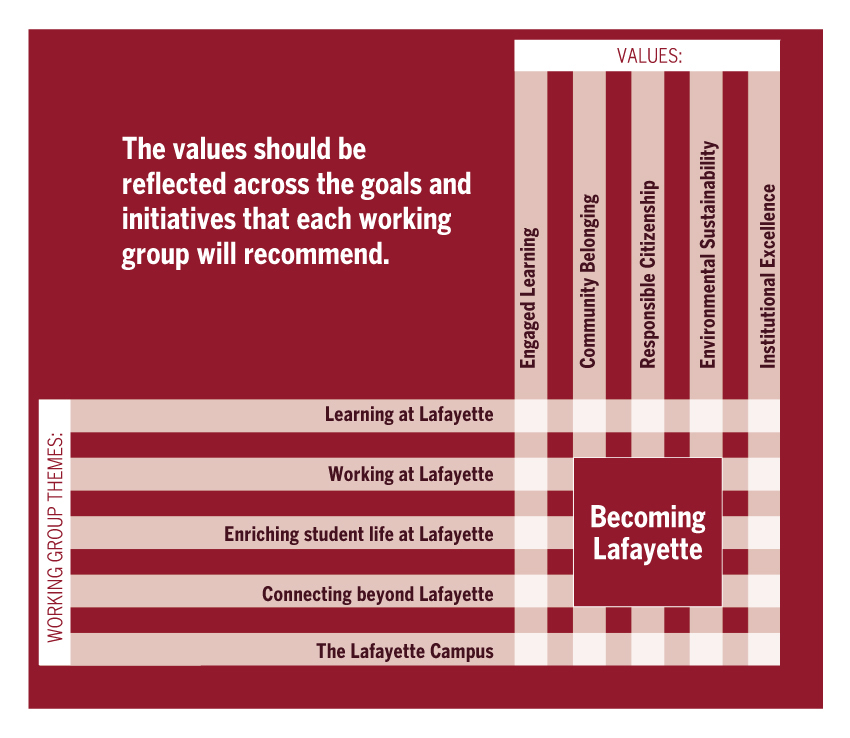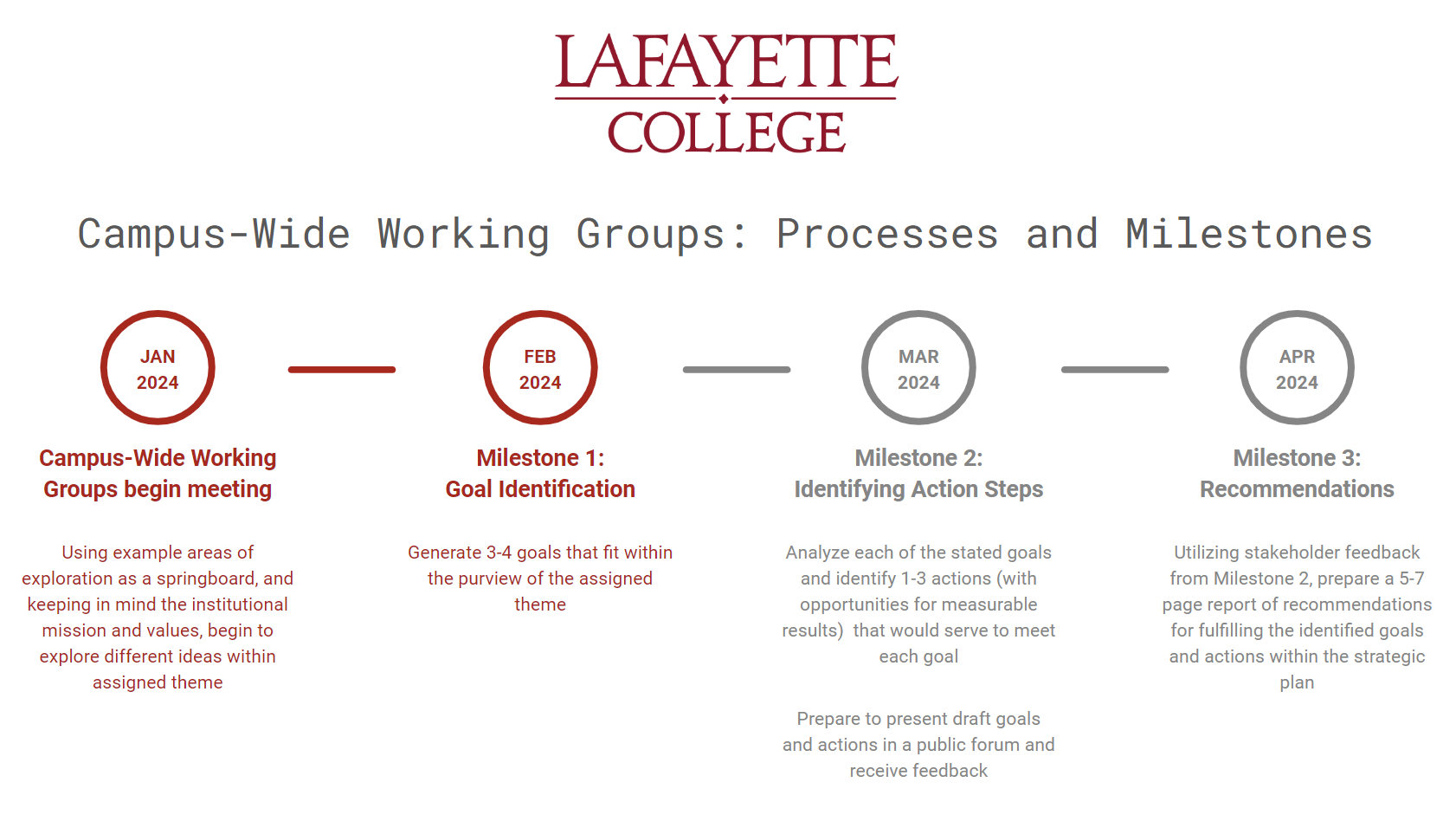From the Steering Committee Charge:
In March of 2026, Lafayette College will celebrate the 200th anniversary of its founding by the citizens of Easton, Pennsylvania. Inspired by the return of the famed Revolutionary War general to America in 1824, the College was founded to create educated citizens who could lead this still-young nation to a bright future. Much has changed in America and in higher education since those early days, but the College remains a stalwart force that continues to educate young people to serve and lead in organizations and communities of every kind, in the US, and across the world. The core mission of educating our citizenry has not changed; the commitment, ingenuity, and intellect of our faculty, staff, and students have ensured that our methods for reaching that goal have remained vibrant and innovative.
It has been almost 15 years since the College embarked on a full strategic planning process that engages the entire community in deep dialogue and thorough contemplation of this vital institution’s mission, values, and priorities. The rapid pace of change in our society, and in the landscape of undergraduate higher education, calls Lafayette to accept the challenge now of renewing close consideration of our future and harnessing the collective power and creativity of our dedicated community of faculty, staff, students, alumni, parents, neighbors, friends, and other stakeholders. As I stated when this process began: “Building a strategic plan that will guide College decision-making for the years ahead presents all of us with a critical opportunity to chart our future together.”
The strategic planning process’s name, Becoming Lafayette, reflects the theme of my inaugural address. In that address, I noted that I was inspired by Michele Obama’s book, Becoming, and its emphasis on the evolutionary journey we all can take toward a better future. I suggested that leading the College would not be a sprint or a marathon, but a relay that our community would engage in together. Through this planning process, we aspire to “become Lafayette” anew by honoring the accomplishments of those who carried the baton before us and, in building upon that strong foundation, defining the next stage of Lafayette’s service to our students, our community, and our world. The Campus-Wide Working Groups will play a seminal role in helping to chart that path forward.
Campus-Wide Working Groups:
Purpose and Structure: Each Campus-Wide Working Group aligns with themes identified by the work of the Steering Committee as priority areas most central to the future of Lafayette College. Each group will be made up of strategic planning steering committee members partnering with colleagues from across the College and, as appropriate, external stakeholders. Each group will have 10-15 members and will be co-chaired by one member drawn from the steering committee, and one drawn from the larger College community. The majority of group members will be community members not currently serving on the Steering or Feasibility & Implementation Committees.
The primary work of the Campus-Wide Working Groups is to develop goals and related actions that align with the needs of their assigned theme. The goals identified should be broad, long-term outcomes, while the actions represent initiatives that the College can take to move toward achieving those goals.
In carrying out this charge, each Campus-Wide Working Group will ensure that their recommendations generally align with the College’s stated mission and values. While certain recommendations will undoubtedly resonate more naturally with certain values, each of the five values should be apparent to some degree within the goals and actions suggested. The diagram below illustrates the relationship between mission, values, themes, and working group goals and actions within the strategic planning process:

Process and Milestones: The working groups will begin meeting in January and have recommendations to the Steering Committee by April of 2024. Using the example areas for exploration as a springboard, the working groups should strive to generate goals that fit within the purview of each theme, ultimately narrowing their focus to no more than 3-4 goals. Goal identification represents Milestone #1 of the process and should be completed by February 2024.
Next, each working group should analyze each of their goals and identify 1-3 actions that would serve to meet this goal. These actions should provide opportunities for measurable results. For example, one could imagine under the theme of “Learning at Lafayette” that a goal could be ensuring every student has an experiential learning opportunity over their four years. A corresponding initiative under that goal could be increasing opportunities for paid research or internship opportunities for students, with concrete action steps related to meeting the stated goal. Identification of actions represents Milestone #2 and should be completed by March 2024. At that time, the working groups should also be prepared to present their draft goals and actions in a public forum to receive the thoughts and feedback of community members, including the Board of Trustees.
In April, the working groups should consider the feedback collected and provide to the Steering Committee a draft report of 5-7 pages that includes their recommendations. This represents Milestone #3 and will be the final deliverable expected from the working groups. The co-chairs of the working groups, however, will remain engaged with the Steering Committee as they write and develop further the draft recommendations that will make up the strategic plan. Drafts will be shared with working group membership and with the Board of Trustees for comment in May of 2024. Members of the Steering Committee will review and refine the draft recommendations into a DRAFT strategic plan document in the Summer of 2024. This draft will be presented to the community at the start of the Fall 2024 semester for further comment and refinement. The final draft should be complete by October of 2024. The diagram below summarizes the timeline and milestones for the Campus-Wide Working Groups:

Over the course of the project, the Campus-Wide Working Groups will continue to receive guidance from the Steering Committee and the Feasibility & Implementation Committee. A Pre-Tenure Faculty Group will also contribute their thoughts and feedback to the project. The working groups will also benefit from the data and analysis provided to the Steering Committee, as well as situational analysis data prepared for the project.
As the strategic planning processes ahead will continue to be agile and dynamic, amendments to this Charge and timeline may be required and, if so, will be discussed with the Steering Committee and Campus-Wide Working Groups prior to formal adoption.
To great things ahead!
President Nicole Hurd

